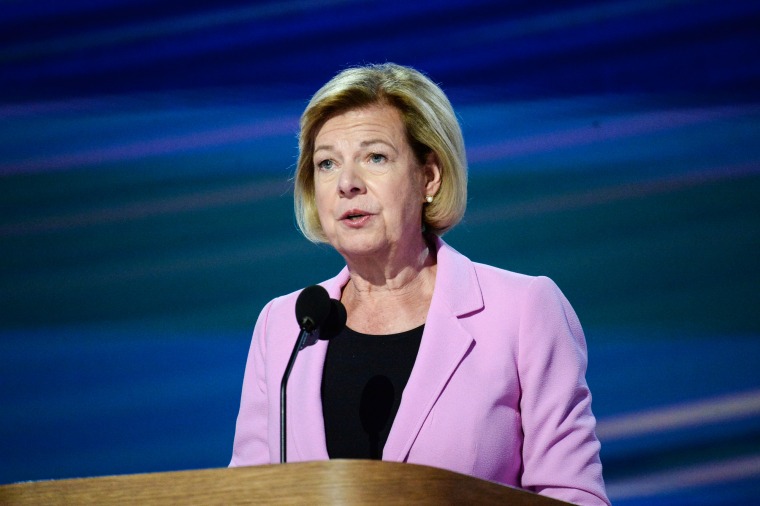The Senate on Wednesday passed the National Defense Authorization Act, or NDAA, a massive defense spending package that includes a ban on coverage of gender-affirming care for the transgender children of military service members.
The vote in the Senate was 85 to 14, after the House last week passed the bill, which was negotiated by Senate and House leaders of both parties. It now heads to President Joe Biden's desk.
The $895 billion bill sets the budget for the Defense Department for the following year. It includes over a thousand pages of defense policy, but the ban on gender-affirming care for minors drew particular ire from Democrats.
Over 20 Democratic senators, led by Sen. Tammy Baldwin, of Wisconsin, sought to amend the bill Monday to remove language that would ban the military's health care service, Tricare, from covering “medical treatment for military dependents under the age of 18 who are diagnosed with gender dysphoria.”

Their push was unsuccessful, but Senate Majority Leader Chuck Schumer on Tuesday acknowledged, "Of course, the NDAA is not perfect."
"It doesn’t have everything either side would like. It includes some provisions that we Democrats would not have added and other provisions that we would want left out entirely. But of course, you need bipartisanship to get this through the finish line," Schumer added at a news conference on Capitol Hill.
In a separate speech on the Senate floor Tuesday, Schumer again acknowledged that the final version of the NDAA "is not a perfect bill."
"It nonetheless has some very good things that Democrats fought hard for that will strengthen military families and boost tech innovation here at home, something very important to me," Schumer added, highlighting the Democratic wins in the bill.
House Speaker Mike Johnson, R-La., was a major proponent of adding the ban on gender-affirming care for minors to the legislation, attacking gender-affirming care as "radical woke ideology" in a statement after the House vote last week.
The NDAA refocuses “the Pentagon on military lethality, not radical woke ideology. This legislation permanently bans transgender treatment for minors, prohibits critical race theory in military academies, ends the DEI bureaucracy, and combats antisemitism," Johnson said.
In the House, the bill passed 281-140, with 200 Republicans and 81 Democrats voting in favor of it and 124 Democrats and 16 Republicans voting against it.
In a statement alongside her push to amend the bill and remove the language banning gender-affirming care, Baldwin said military service members had "earned the right" to make decisions about their children's care, rather than the federal government.
“Let’s be clear: We’re talking about parents who are in uniform serving our country who have earned the right to make the best decisions for their families. I trust our service members and their doctors to make the best health care decisions for their kids, not politicians,” she said.
Rep. Adam Smith, D-Wash., the ranking member of the House Armed Services Committee, blasted the provision last week and voted against the bill.
“The inclusion of this harmful provision puts the lives of children at risk and may force thousands of service members to make the choice of continuing their military service or leaving to ensure their child can get the health care they need," Smith said in a statement.
